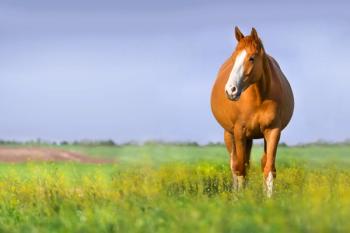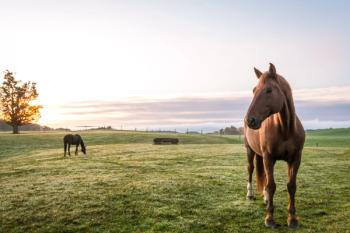
Ileal impaction: a preventable life-threatening condition
Impaction of the ileum is an uncommon cause of colic in horses in most parts of the country, but is becoming increasingly recognized as an important cause of intestinal obstruction in the southeastern United States.
Impaction of the ileum is an uncommon cause of colic in horses in most parts of the country, but is becoming increasingly recognized as an important cause of intestinal obstruction in the southeastern United States.
Interest in the condition has been heightened by the belief that feeding of Coastal Bermuda hay causes ileal impaction, which is the most common type of hay available in much of the Southeast. Owners have been eager to know more about ileal impaction and coastal hay, because unlike beliefs about colic and the weather, owners have control over what they feed their horses.
Photo 1: Surgical view of an ileal impaction (left) with the cecum in view on the right. Note the distended "tubular" appearance of the impacted ileum.
In short, owners want to know if they should feed Coastal Bermuda hay to horses. The ultimate answer is likely to be yes, as long as it's high quality Coastal Bermuda hay. On the other hand, poor quality Coastal Bermuda hay is likely to be a problem, and recent studies have verified that there is a definite association between feeding of Coastal Bermuda hay and ileal impaction.
To feed or not
Another recent development in our understanding of ileal impaction has been the finding that tapeworms can also cause this type of colic. Fortunately, feeding regimens and de-worming strategies can be adopted to reduce the risk of ileal impaction.
Ileal impaction is a condition in which the terminal end of the small intestine becomes blocked by a bolus of feed, resulting in progressive distension of the small intestine and onset of colic. Key clinical signs during the early stages include mild, but persistent, signs of colic, and two to three loops of distended small intestine adjacent to the cecum on rectal palpation.
Defining ileal impaction
Comparison of the physical appearance of Coastal Bermuda hay (top) with Timothy hay (bottom). Note the finer fibers in the Coastal Bermuda hay.
In some instances the actual impaction can be detected on rectal palpation, but it is usually hidden by adjacent distended bowel. As the condition progresses, the intensity of the colic will increase, additional distended loops of small intestine may be detected on rectal palpation, and the horse will begin to reflux stomach contents following passage of a stomach tube.
An abdominocentesis is useful in cases like these in order to differentiate simple intestinal obstruction from strangulating intestinal obstruction. Horses with simple intestinal obstruction, such as ileal impaction, will have normal abdominal fluid until the very latter stages of the disease (duration in excess of 12 to 18 hours), whereas horses with strangulating obstruction, such as a strangulating lipoma or epiploic foramen entrapment, will typically have serosanguinous fluid with escalating protein (>2.5g/dl) and cell counts (>10,000 cells/ ml) as the condition progresses.
Ileal impaction can be treated medically if caught early, and if the degree of small intestinal distension is manageable. In other words, horses with mild colic that can be controlled with analgesics such as flunixin meglumine, with mild small intestinal distension on rectal palpation, but without nasogastric reflux are candidates for medical treatment. This treatment should include intravenous fluids to rehydrate the horse, and attention to acid-base and electrolyte abnormalities.
Medical treatment
Horses should not be given any fluid or laxative medications by stomach tube, as this will only end up refluxing into the stomach. In addition, very close attention should be given to the horse's progress, including periodic monitoring of intestinal distension on rectal palpation or abdominal ultrasound, periodic nasogastric intubation and attention to the level of pain.
Abdominal fluid analyses are also very important to document any change in intestinal integrity. Horses whose pain cannot be controlled with reasonable analgesic regimens such as appropriate administration of flunixin meglumine (1.1mg/kg IV q12h, or 0.3-0.5 mg/kg q8-12h) should be considered as candidates for surgery, particularly in the face of multiple distended loops of small intestine and nasogastric reflux. Once at surgery, the impaction is identified and massaged into the cecum (Photo 1).
Additional Reading
Preventive measures relate specifically to feeding and deworming regimens. Recent evidence indicates that there is at least a three-fold increased risk of a horse developing an ileal impaction if Coastal Bermuda hay is fed, confirming what owners and veterinarians have long believed to be the case. The reason for this association is likely to be the physical characteristics of the hay, which have fine fibers (Photo 2, p. 1E), particularly when excessively fibrous, that appear to form obstructive masses, much like hair blocking a drain.
In addition, it is likely that horses do not chew this type of hay as well as coarse-fibered hay. Finally, horses may overeat Coastal Bermuda hay when it is offered free choice, such as placing round-bale hay in a pasture, because they spend less time chewing the hay. However, if the Bermuda Coastal hay is good quality, the likelihood is that the risk of impaction is low.
The parameters for selecting a hay to avoid this type of impaction are currently being investigated. In the mean time, owners should have their hay nutritionally analyzed, and consult with an extension nutrition specialist.
One other interesting finding from a recent study was the association of ileal impaction with a failure to deworm with an anthelmintic capable of killing tapeworms (in this study, any pyrantel product was considered to have the ability to kill tapeworms, regardless of dose). This was assessed because investigators in the United Kingdom had previously implicated tapeworms in impaction of the ileum.
Deworming connection
In the American study, horses that had not received any pyrantel-based product within three months of being admitted to the hospital for colic, had a three-fold risk of developing ileal impaction, presumably because tapeworms preferentially collect at the ileocecal junction. Therefore, owners should administer an anthelmintic capable of killing tapeworms at least twice yearly in order to reduce the risk of this type of colic.
Fortunately, there are a number of new anthelmintics on the market capable of killing tapeworms as well as strongyles, making it easier for owners to comprehensively deworm their horses.
Dr. Blikslager, DVM, Ph.D. is assistant professor of equine surgery at North Carolina State University, where he also heads up the Colic and Digestive Disease Program.
Newsletter
From exam room tips to practice management insights, get trusted veterinary news delivered straight to your inbox—subscribe to dvm360.




